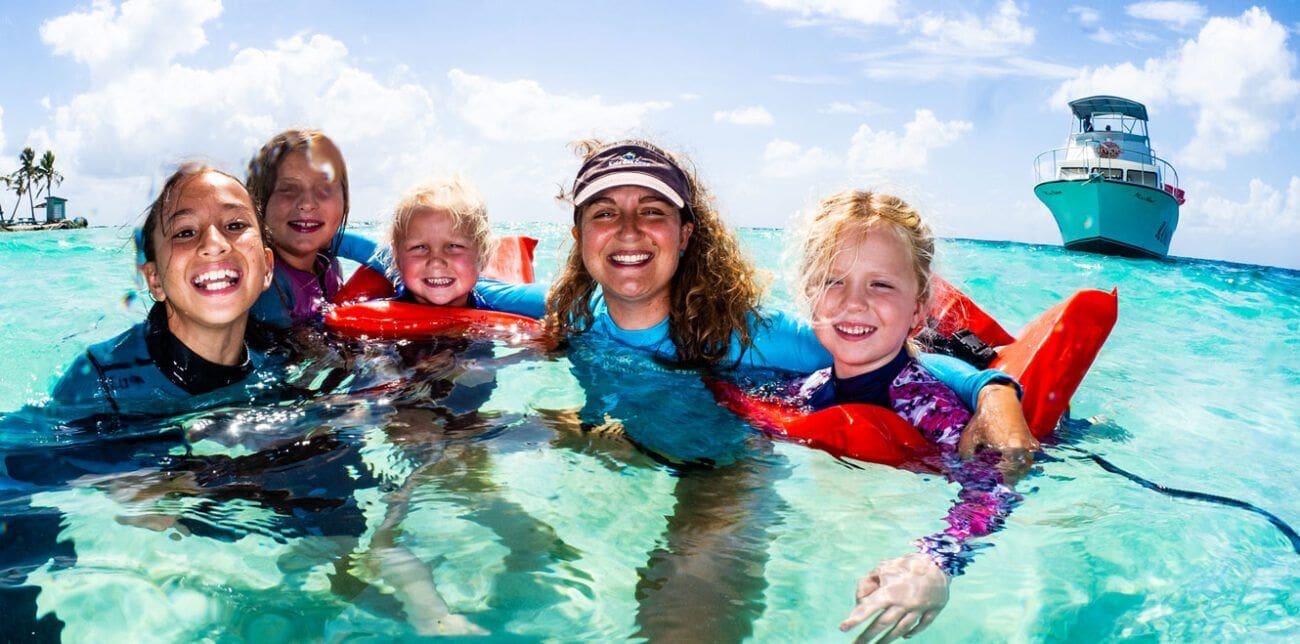Safety Tips on diving with your kids
Discover Scuba Diving with Your Family: A guide to Safe and Unforgettable diving with your kids.
Dear Scuba Moms and Dads,
Imagine sharing the magic of the underwater world with your children, exploring vibrant coral reefs, encountering fascinating marine life, and creating memories that will last a lifetime. Scuba diving can be an incredible family activity, fostering a love for the ocean and building bonds through shared experiences. For 25 years, I’ve had the privilege of diving with families around the globe, issuing hundreds of youth certifications each year. My passion is ensuring that these adventures are fun, safe, and enriching. I’ve compiled this list of helpful tips on diving with kids to help parents navigate the world of family scuba diving and make informed decisions that prioritize your children’s well-being. Please reach out with any questions or if you’d like to share your own experiences.

Planning Your Family Dive Experience: Key Considerations
One of the most common concerns I hear from parents is the feeling of vulnerability when booking independent dive trips with kids. Stories of close calls and stressful dives are unfortunately too frequent. To help you better avoid such situations, here are some critical best practices:
Dive Operator Selection: Choosing the right dive operator is paramount. Look for operators with a proven track record of prioritizing safety, especially when working with children. Ask specific questions:
- Are they experienced in teaching and guiding young divers?
- Do they offer specialized programs for kids, like Seal Team or Junior Diver courses?
- What is their instructor-to-student ratio for dives involving children? Are you comfortable with those ratios? My Ratio for kids under 12 is one instructor per 2 kids. Special needs is 1:1
- Do they have appropriately sized gear for children, including smaller tanks, BCD, and mouthpieces?
- Does that dive operation follow depth mandates for kids?
- What safety equipment do they carry on their boats (oxygen, first aid, communication devices)?
- What is their emergency plan, and where is the nearest hyperbaric chamber?
- Are all instructors and dive masters current, active, and up-to-date on their training?
- What is their policy regarding children on their dive boats?
Understanding Youth Diving Standards: Familiarize yourself with the specific depth and supervision requirements for your child’s age and certification level. This information is readily available on their certification card and through reputable dive organizations like PADI. Don’t hesitate to ask your dive instructor or local dive shop for clarification. Key tips on diving with kids:
- Children 8+ can experience confined water dives (pool) with programs like the PADI Seal Team and Master Seal Team, reaching depths of up to 12 feet only in a controlled pool environment and under the direct supervision of a PADI Pro. This program is not open water dives unless waivers are provided by PADI to go in the ocean. There are other programs, such as SSI Scuba Rangers and PADI Bubble Maker. Ask your dive operator about the standards for these programs.
- Junior Open Water Divers (10-11 years old) have a maximum depth limit of 40 feet and must dive with a parent or PADI Pro.
- 12-year-olds can dive to 60 feet, and with a Junior Advanced Open Water certification, they can explore depths up to 70 feet. However, they can only do this with a parent or a PADI Pro.
- The recreational diving limit of 120 feet is only reached at age 15. (based on training, comfort, and experience.)
- Children should never dive with other children without the parent or PADI Pro present.
Parental Preparedness: Your role as a parent diver is crucial. Ensure you are:
- A confident and competent diver yourself, with up-to-date skills and knowledge of dive safety protocols.
- Physically fit and able to assist your child in case of an emergency.
- Pre-Trip Refresher: A pool refresher before your trip is an excellent way for kids to re-familiarize themselves with their gear and basic skills.
- Open Communication: Talk to your children about what to expect on their dives. Address any fears or anxieties they may have.
- Buddy System: Emphasize the importance of staying close to their buddy (you or the assigned dive professional) and maintaining visual contact at all times.
- Respect for Marine Life: Teach your children to observe marine life respectfully and avoid touching or disturbing underwater creatures.
- Log Your Dives: Keeping a dive log is a fantastic way to track your family’s underwater adventures and celebrate your shared experiences.
- Have a Wet Notes pad or something to communicate with your child during the dive.
Essential Do’s and Don’ts:
- Do: Thoroughly research dive operators. Prioritize safety. Know your child’s certification limits. Communicate openly with your children. Ensure properly fitted gear. Stay close to your buddy. Practice safe diving habits (safety stops, etc.). Respect marine life.
- Do bring a Pro and a local guide with you on your dives
- Do some research about all the marine life you may encounter on your dive choice
- Do hydrate and get plenty of rest before a dive
- Do share your dive plan with your kids
- Do make sure you plan your dive and dive your plan
- Do share any of your concerns with your chosen dive operator
- Do list any medications or conditions on the waiver forms
- Check with your doctor to ensure any conditions or medications are approved for diving activities.
- Do have fun and share your positive experiences with family and friends
- Don’t: Make assumptions about safety practices.
- Don’t: Hesitate to ask questions.
- Don’t: Exceed your child’s limits.
- Don’t: Pressure your child to do something they’re uncomfortable with.
- Don’t: Compromise on gear quality.
- Don’t: Forget to check gauges and air supply—neglect pre-dive checks.
- Don’t: Forget to be ready and fit both mentally and physically before taking your child on a dive.
Scuba diving with your family can be an enriching experience. By prioritizing safety, choosing reputable operators, and staying informed, you can create unforgettable adventures that deepen your family bonds and foster a lifelong appreciation for the underwater world. These tips on diving with kids should help make your next KSC adventure more rewarding.
Kids Sea Camp founder, Margo Peyton

